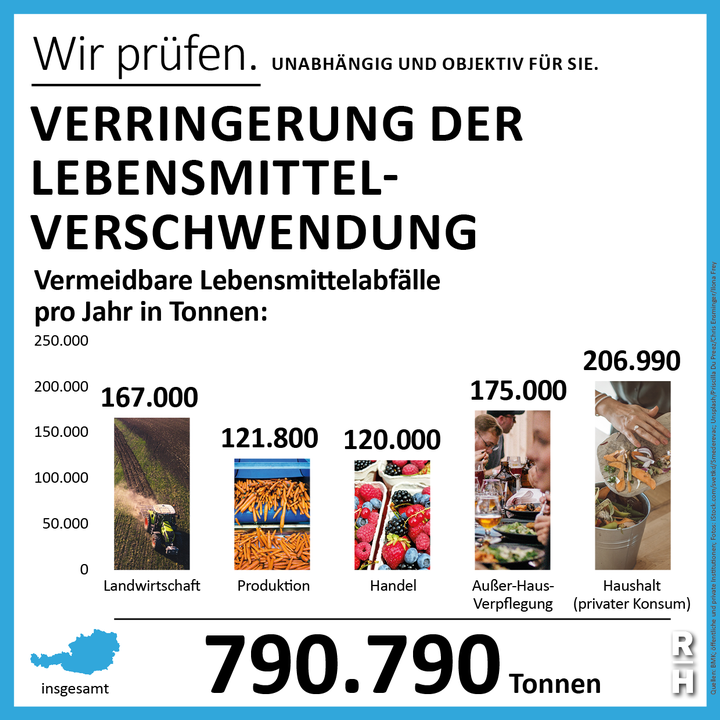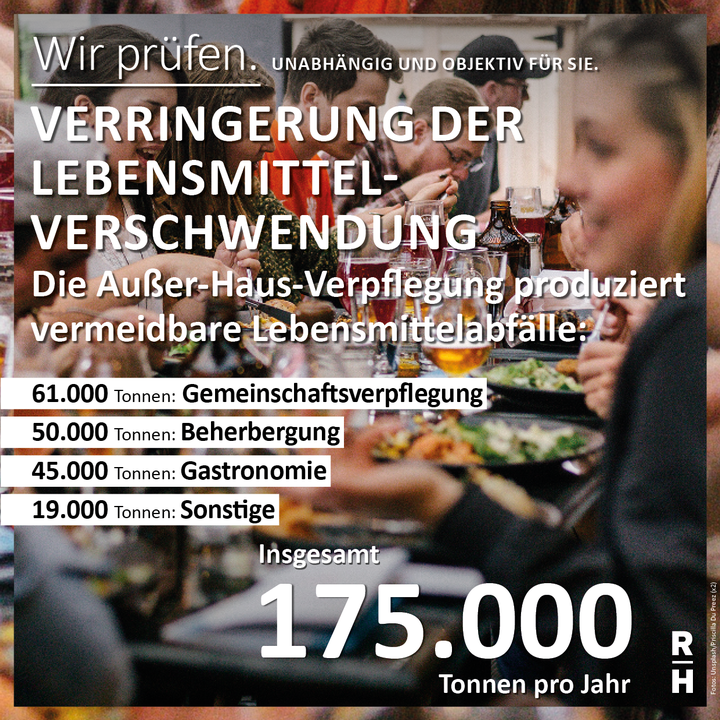The ACA unveils considerable extent of food waste generation

790,790 tons of preventable food waste are generated in Austria per year. The Austrian Court of Audit (ACA) has ascertained this based on the data it analyzed in the course of its audit "Reducing Food Waste – Implementation of SDG Target 12.3 of the 2030 Agenda". As a fact, up-to-date figures on the actual extent of food waste, which should have been collected by the Federal Ministry for Climate Action systematically and comprehensively, are lacking in Austria. Therefore, it will not be possible to evaluate whether Austria will attain the Sustainable Development Goal (SDG) to halve per capita food waste by 2030. This goal was agreed by the Heads of State and Government of the United Nations Member States in 2015 in the framework of the 2030 Agenda.
Only an “approximate overview” of food waste
Of the 790,790 tons of preventable food waste generated in Austria per year, private households account for the largest part of 206,990 tons. In the food service and catering sector 175,000 tons of preventable food waste end up in the garbage bin. With 120,000 tons, the trade sector generates the lowest amount of preventable food waste of all sectors. These figures, however, provide – as stated in the report – only an “approximate overview”. This is due to the fact that the data were collected at different points in time: those concerning the private sector, for example, in 2012 and those with regard to food services and catering in 2015.
In the audited period of 2016 to 2019, the Federal Ministry for Climate Action failed to carry out a regular collection of data on food waste for all sectors of the food chain. The ACA recommends to the Federal Ministry for Climate Action to collect, in regular intervals, data on preventable food waste for the whole food chain in accordance with the EU directives.
Not possible to measure whether the SDG will be attained
“By 2030, halve per capita global food waste at the retail and consumer levels and reduce food losses along production and supply chains, including post-harvest losses“ – this is provided for by SDG Target 12.3. According to the ACA’s point of view, it will not be possible to assess in 2030 whether this goal was met in Austria due to a lack of valid data. The ACA furthermore notes that the EU lacked a methodology and minimum quality requirements for a uniform measurement of food waste at a global level and until 2019.
Handing out food to social institutions

In accordance with the Government Programme 2020–2024, the food retail sector shall be prohibited from disposing of food that is fit for human consumption. The cooperation model currently practised in Austria, which is based on voluntariness, works well according to the Federal Ministry for Climate Action and representatives of social institutions. Compared to 2013, twice as much food (12,250 tons) was handed out to social institutions by food retailers in 2017. Social institutions, however, repeatedly expressed concerns with regard to the plans to ban the disposal of food that is fit for human consumption. In doing so, they pointed to the lack of possibilities to ensure sufficient financial and human resources as well as sufficient cooling, storage and distribution capacities. In the event that food companies are legally obliged to donate food to social institutions, the ACA recommends to the Federal Ministry for Climate Change to consider the necessary infrastructural, logistical and financial framework conditions.
A strategy for reducing food waste is needed
As regards the national implementation of the 2030 Agenda, the Federal Government stipulated in January 2016 that the ministries shall integrate the SDGs in their relevant strategies and programmes and, if need be, elaborate corresponding measures and action plans. According to the Federal Ministry for Climate Action, the action programme “Lebensmittel sind kostbar!” (“Food is precious!”) and the waste prevention programme served as strategies. However, the action programme mainly included operational measures, such as the announcement of the "VIKTUALIA Award" or the organization of cooking workshops. The ACA, however, finds that a comprehensive strategy to reduce food waste is lacking. Furthermore, both programmes focus primarily on the trade, food service and catering sectors and on private consumption.
The ACA recommends to the Federal Ministry for Climate Action to elaborate, in consultation with the Federal Ministry of Agriculture, Regions and Tourism and the Federal Ministry of Social Affairs, Health, Care and Consumer Protection, a strategy to reduce food waste. In this regard, all sectors of the food chain should be involved – i.e. also the agricultural and production sector.
- pdf Datei:
- 3,163.9 KB
- Umfang:
- 64 Seiten
Report: Reducing Food Waste – Implementation of SDG Target 12.3 of the 2030 Agenda (in German)
From January to May 2020, the ACA audited the implementation of the SDG Target 12.3 of the 2030 Agenda – the reduction of food waste. The audit aimed in particular at assessing the legal framework conditions, the responsibilities, strategies and measures, the collaborations and the reporting with regard to the implementation of the reduction of food waste. The audited period essentially spanned the years from 2016 through 2019.


